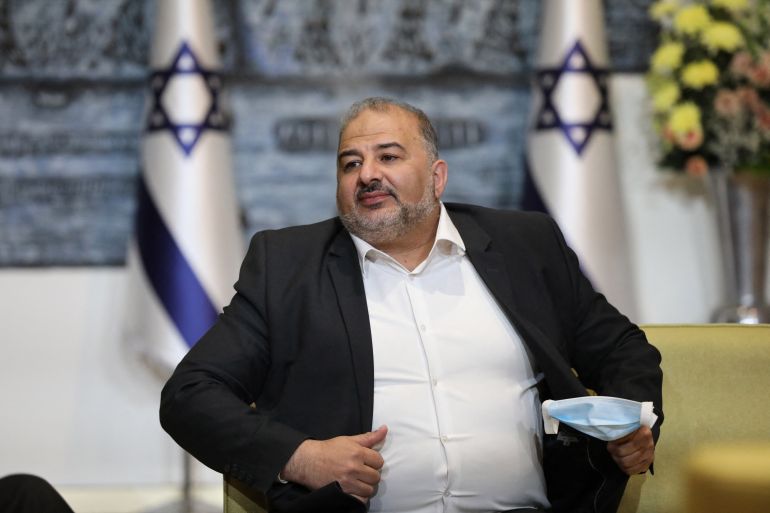Can United Arab List change Israeli politics from within?
Ra’am party is walking a fine line between catering to its Palestinian-Israeli voters and partnering with Israel’s far-right.

In view of the political drama surrounding Benjamin Netanyahu’s departure, a novum in Israeli politics almost faded into the background: For the first time in Israel’s history Mansour Abbas’ United Arab List (Ra’am) became part of a coalition government.
However, Ra’am faces the difficult task of walking a fine line between catering to its Palestinian voters and being a reasonable partner to Israel’s extreme right.
Keep reading
list of 4 itemsHow activists are targeting an Israeli shipping line
Progress on mutual interests in spotlight as Israel FM visits UAE
Israeli apartheid on campus
Even though Palestinians make up almost 20 percent of Israel’s population, a voice for the minority has traditionally been largely excluded from the political decision-making process.
Their representatives were personae non-gratae, undesirables, not only in ultra-orthodox and right-wing circles but also for secular left and liberal parties.
After the March 2020 elections, Ra’am offered to support a centre-left coalition under Benny Gantz. However, Gantz turned down the offer – for fear of being torn apart by the right-wing camp as an Arab fraterniser and instead entered a coalition with his rival Netanyahu – a choice he will have regretted by now.
Thanks to Netanyahu, who in the past was often inclined to politicise the Arab question ad nauseam and stir up antipathy against them, Ra’am is now a member of the Israeli government.
“A taboo was broken, ironically by the Netanyahu camp, which tried – and failed – to get Arab support for Netanyahu’s coalition. The methods used were quite despicable,” Benyamin Neuberger, professor emeritus of political science at The Open University of Israel, told Al Jazeera.
However, Netanyahu legitimised Ra’am, allowing the anti-Netanyahu camp – the Bloc for Change – to get Ra’am to join the coalition.
“From now on, any coalition with Arab parties has become legitimate – and this for the first time in Israeli history,” said Neuberger.

Within the system
However, it was not merely the political landscape that has witnessed a change but also Israel’s society. In February 2020, polls indicated only 23 percent of Jewish voters would support the idea that the country’s Arab parties support an Israeli government. In April 2021, a poll found now 48 percent of Jewish voters had warmed up to the idea.
Ra’am thus became increasingly cognizant that it can achieve more within the system.
Usually, the Palestine question would dominate the election programmes of the Arab parties, but turnout among the Arab community remained relatively low. This year’s turnout marked the worst in history, at 44.6 percent.
Nonetheless, this indifference to politics forced Arab parties to usher in a paradigm shift, away from prioritising Palestinians in the occupied territories and towards improving the living conditions of their voters, the Palestinian citizens of Israel. It is a strategy change that made sense, given that voting Palestinian citizens appear to be interested in their own fate, first and foremost.
The Arab parties are responding to the changing mood of their voters, who are increasingly interested in bread-and-butter issues: rising criminal violence in the Arab towns and villages; education; social services; discrimination in employment and municipal budgets, said Neuberger.
“Ra’am was successful in going with the trend.”
However, while Ra’am has benefitted from this new reality in Israel, the status quo will not necessarily represent the future. Fundamental concerns among Jews towards Ra’am remain regarding defence, public security, and foreign policy.
Ra’am naturally advocates for creating a Palestinian state in the West Bank and Gaza Strip, with East Jerusalem as its capital. It also supports equal rights for Palestinian citizens of Israel. However, Ra’am is also ideologically aligned with Egypt’s now-banned Muslim Brotherhood and Hamas in Gaza. The latter, in particular, raises difficult questions the coalition will need to find an answer to, particularly if a conflict with Gaza would erupt again.
Ra’am walks a fine line, particularly regarding the Israel-Palestine conflict.
However, Neuberger said the primary change in this matter will not be brought about by Ra’am, but by the fact the centre and, even more so, the left has become part of a coalition that agreed on a compromise with the rightist part of the coalition.
“This compromise has made it easier for Ra’am to join the coalition,” he said.
‘Ideological concessions’
Nonetheless, having joined forces with Israel’s far-right will undoubtedly be seen as a betrayal of the Palestinian cause by some. In an attempt to negate this notion, Ra’am leader Mansour Abbas has shown his proclivity for following a blueprint the ultra-Orthodox religious party SHAS previously advocated, said Neuberger.
“Abbas will make ideological concessions, such as acceptance of Zionism and recognition of the Jewish state, in exchange of support for its party interests, for example funding for its schools.”
However, given the reality that Ra’am only holds four seats in the Knesset, the coalition will still cater more to the Jewish majority, which seems natural.
The fundamental change seems to be that from now on, the Arab minority will matter more than it used to do in the past, said Neuberger.
For his party’s vote, Abbas demanded additional funds for the Arab sector. Co-Prime Ministers Naftali Bennett and Yair Lapid agreed and doubled the budget of the five-year plan for developing Israel’s Arab sector to 35bn shekels ($10.75bn).
Moreover, Ra’am secured the subsequent recognition of three illegally established Bedouin villages in the Negev desert, a constituency that consists mainly of religious or nationalist Palestinian citizens of Israel. It marks a pivotal change in Israeli politics – Knesset representation with the power to move issues in Palestinian favour.
“This is the first time in Israel’s history that an Arab national party is part of the government and that the government is dependent on its vote for formation, survival and legislation. This is an unprecedented situation – unlike the Rabin’s coalition in 1992-95 when Arab parties supported the government from the opposition,” Sammy Smooha, professor of sociology at the University of Haifa, told Al Jazeera.
“Ra’am’s main purpose in this coalition is to serve as the main representative of the Arabs in Israel and to be more representative than other Arab leadership bodies such as the Joint List, the Council of Heads of Arab Local Councils, and the Higher Fellow-Up Committee.”
As such, Ra’am will likely insist on implementing other policies such as the allocation of land for Arab public needs and housing, the war against violence and crime in the Arab sector, and the building of an Arab university in the Galilee, said Smooha.
Particularly the crime issue is increasingly devastating the Arab communities, with homicide unwaveringly mounting.
However, the representation will not make up for the apparent encumbrances in Ra’am’s way.
Bennett, who once called Abbas a “terrorist supporter”, advocates Jewish settlement policy and is a vehement opponent of a Palestinian state. Indeed, most coalition partners are right-wing nationalists who may be critical of Netanyahu’s persona, but not necessarily of his policies.
How many concessions are conceivable in such an environment?
The political involvement of an Arab party alone is hence unlikely to lead to reconciliation between Jews and Muslims. The latest religious unrest has shown how fragile coexistence remains.
However, with the historic coalition agreement, Palestinian citizens of Israel are no longer pariahs. In the long run, some pundits say, it could bring Jewish and Arab citizens closer together – if this extremely heterogeneous coalition can be maintained.
‘New dynamics’
Moreover, the involvement of Ra’am has the potential to contribute to a certain relaxation of the fronts, as radical steps such as annexation of occupied territories could mean the end of the coalition.
“The new dynamics is that the government cannot ignore the Arab minority’s needs and goals in the civic area and can endanger its survival if it crosses the red lines in the national area,” said Smooha.
These red lines will be omnipresent in Israel’s new government, namely the aforementioned civic and socioeconomic demands or a subsequent Israel war in Gaza, said Smooha.
However, the chances of both red lines being crossed were “not high”, he added.
Despite the promising change in Israeli politics, Ra’am now finds itself in a precarious position in which its leeway to manoeuvre between ideology and reality appears rather limited.
Its role and conduct in the coalition are likely to affect whether Arab parties in government will indeed be seen as legitimate moving forward, or whether it will be filed as a failed experiment and hinder any future progress.